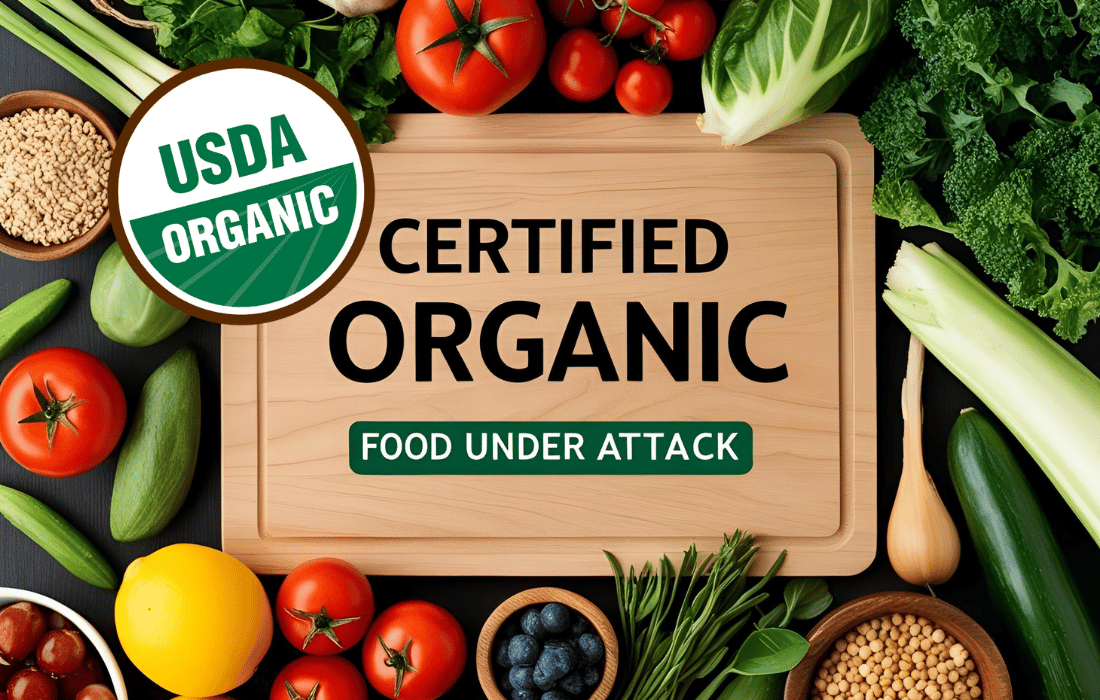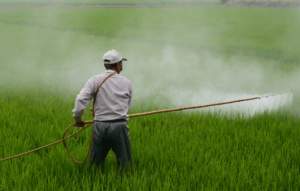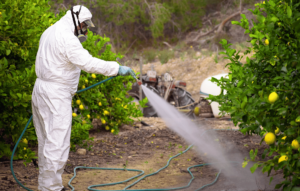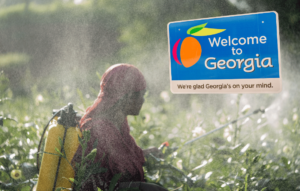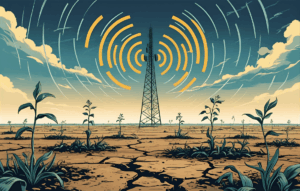Ah, the “organic” label. It conjures pastoral images of happy cows, smiling chickens, and farmers wearing straw hats, cheerfully picking apples. But what if I told you the “organic” carrots you’ve been paying extra for might actually be as conventional as the frozen pizzas two aisles down?
Unfortunately, folks, that’s not hyperbole. Recent revelations from the organic industry watchdog group Organic Eye have shined a harsh light on the widespread corruption undermining the integrity of the organic label. At the center of this issue is a passionate call to action directed at Health and Human Services Secretary Robert F. Kennedy Jr., urging him to collaborate with the USDA to save the authentic meaning of organic agriculture.
The Call to Action: Protecting the True Meaning of Organic
Organic Eye Executive Director Mark Kastel recently appealed directly to Secretary Kennedy, stressing the urgent need for intervention to preserve organic agriculture’s original intent. As Kastel passionately puts it, major agro-industry corporations have increasingly dominated the industry, effectively silencing the small, family-owned farms that initiated the organic movement decades ago.
Kastel’s letter highlights specific corrupt practices endorsed by previous USDA leadership, particularly under former Secretary Thomas Vilsack, whose tenure saw the dilution of organic standards and the rise of fraudulent imports that severely disadvantage genuine organic producers.
The Hijacking of Organic Standards by Big Ag
Organic Eye’s revelations underscore how agro-industrial lobbying has systematically dismantled the foundational principles of the Organic Foods Production Act of 1990. Originally, this act was a revolutionary measure, designed to distinguish organic agriculture from industrial farming practices clearly. However, Kastel explains that powerful lobbying interests have twisted regulations to include controversial methods like hydroponic production and industrial animal farming under the “organic” umbrella, betraying the act’s fundamental vision.
These practices are fundamentally incompatible with authentic organic farming, which prioritizes regenerative methods, humane animal treatment, and environmental sustainability. As large agribusiness interests continue to infiltrate regulatory bodies, small family farmers find themselves increasingly marginalized.
Fraudulent Imports: Undermining U.S. Organic Farmers
Perhaps most troubling is the issue of fraudulent organic imports flooding American markets from countries such as Turkey, India, and China. These imports, which often evade proper certification through regulatory loopholes like “group certification,” drastically undercut domestic organic farmers. These loopholes allow industrial-scale foreign producers to certify massive quantities of goods with minimal oversight, creating unfair competition that genuine U.S. farmers cannot withstand.
Organic Eye emphasizes the devastating impact this fraudulent practice has had on countless American organic farms, forcing them out of business while deceiving consumers who pay premium prices believing they are purchasing authentically organic products.
Vilsack’s Legacy: Regulatory Capture and Ethical Compromise
The troubling developments largely trace back to former USDA Secretary Thomas Vilsack’s administration under Presidents Obama and Biden. Vilsack’s strategy involved stacking the National Organic Standards Board (NOSB)—intended by Congress to represent diverse interests—with individuals deeply connected to the Organic Trade Association (OTA), an influential lobby representing large-scale agribusiness rather than small family farms.
According to Kastel, this regulatory capture has systematically undermined genuine organic standards, replacing meaningful agricultural practices with superficial adjustments that barely distinguish organic from conventional farming. For instance, lobbying efforts successfully changed definitions of “cage-free organic” eggs without genuinely improving living conditions for poultry.
The Corporate Takeover: Who Owns Organic?
It’s no secret that the rapid success of the organic industry attracted corporate giants looking for a share of the booming market. Research from food systems expert Dr. Phil Howard reveals that nearly all of the 30 largest food processors in North America now own at least one organic brand, consolidating control over what was once a movement driven by independent farmers.
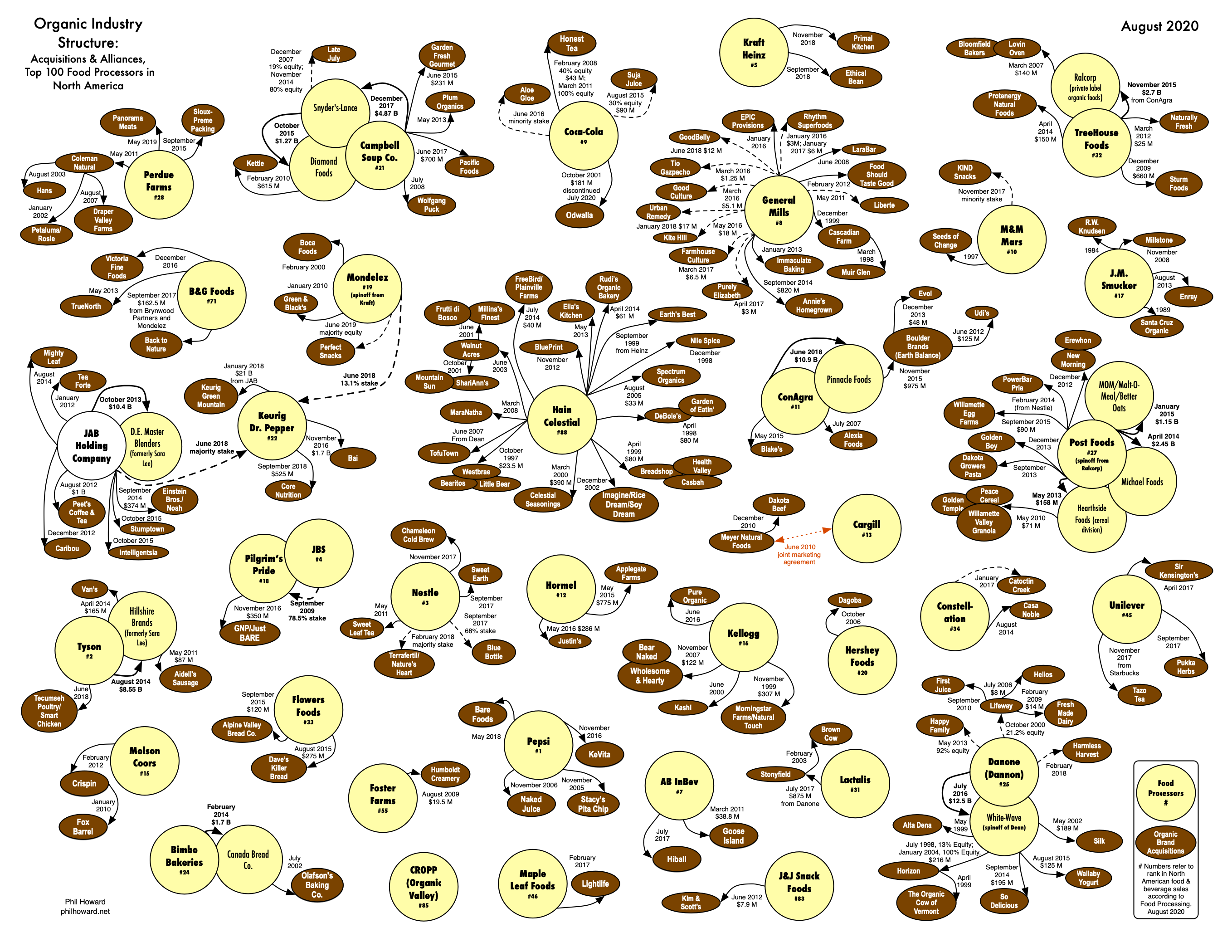
Brands like Horizon Dairy (now owned by Danone), Cascadian Farms (owned by General Mills), and Muir Glen (also owned by General Mills) have transitioned from small organic pioneers to just another label under major conglomerates. This consolidation raises concerns over whether these brands prioritize the health and environmental values of true organic farming—or if they simply optimize for profit while skimping on quality.
"I put together the first version of this graphic in 2003, approximately a year after the USDA's national organic standard was phased in. This national standard helped to catalyze scores of acquisitions of pioneering organic brands by larger food processors and venture capitalists. These trends have only intensified to the point that nearly all of the 30 largest processors in North America have acquired organic brands.
In addition, the scale of transactions has increased, such as the acquisition of natural/organic foods giant WhiteWave by Danone for $12.5 billion (July 2016). Some processors that resisted enormous buyout offers for many years have more recently been acquired for hundreds of millions of dollars (Pacific Foods, Applegate Farms, and So Delicious/Turtle Mountain/Purely Decadent)."Dr. Phil Howard (2020)
As watchdog groups like Cornucopia Institute point out, consumers deserve transparency in knowing who owns their food. The shift from independently run organic farms to multinational ownership means that what is labeled “organic” may not meet the same ethical and environmental standards that people assume.
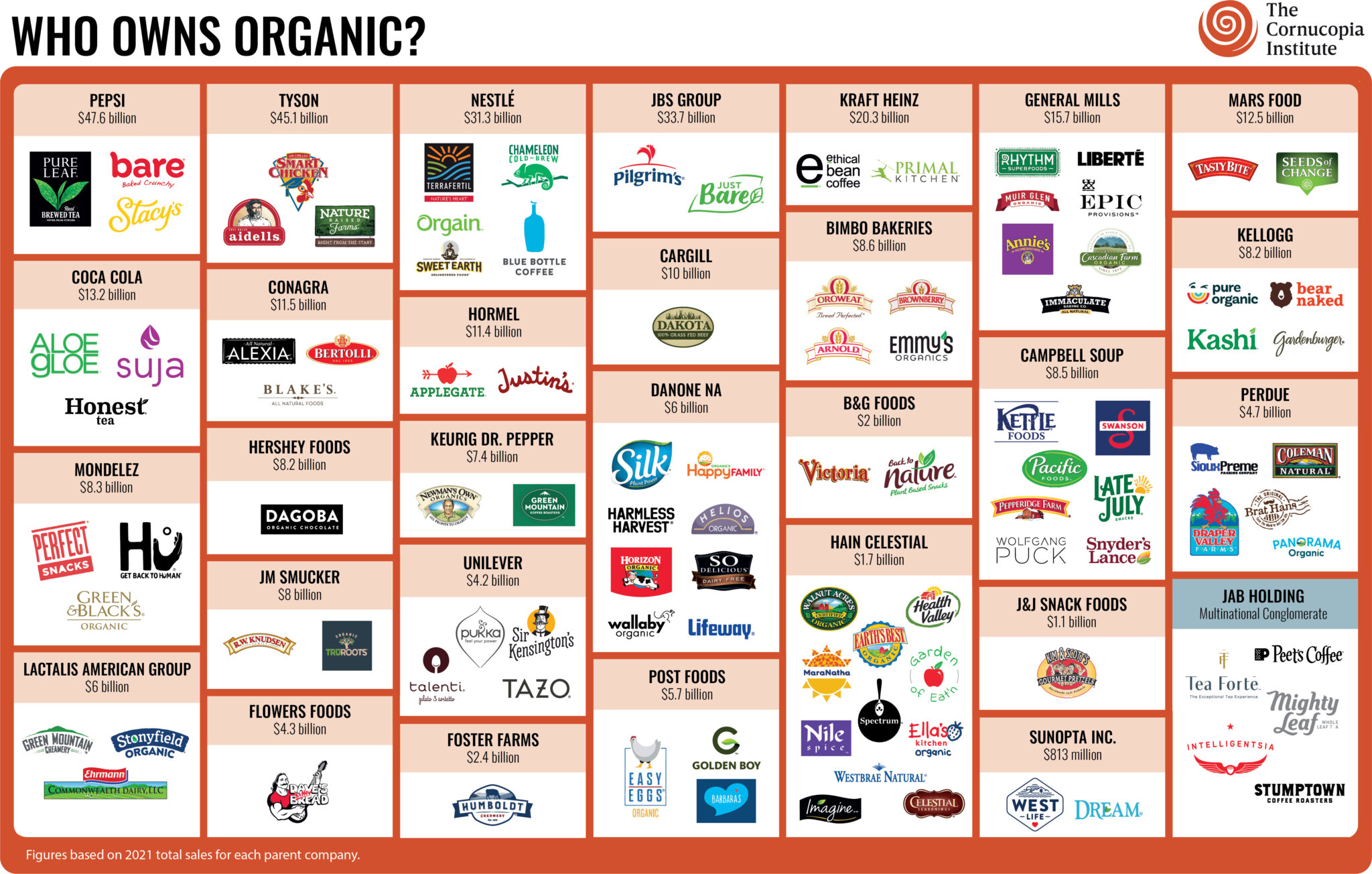
Want to support real organic brands? Browse Cornucopia’s updated Independent Organic Brand List.
Prioritizing an All-Organic Diet: Why It Matters
In an age where food labels are often misleading, the benefits of an all-organic diet go far beyond avoiding pesticides. True organic food supports sustainable farming, protects public health, and preserves the integrity of the land for future generations. Here’s why making the switch matters more than ever.
The Flaws in the Dirty Dozen and Clean 15 Lists
The Environmental Working Group (EWG) releases its annual Shopper’s Guide to Pesticides in Produce™, highlighting the most and least pesticide-contaminated fruits and vegetables. While its Dirty Dozen™ list correctly encourages consumers to choose organic for high-residue crops, its Clean 15™ list misleadingly promotes some conventionally grown fruits and vegetables as safe, despite USDA data showing they can still contain up to 100 different synthetic pesticides.
OrganicEye argues that the EWG’s approach inadvertently echoes food industry messaging that prioritizes price and convenience over consumer health, farmer safety, and environmental sustainability. The reality is that switching to an all-organic diet has been scientifically shown to reduce pesticide metabolites in the body significantly, reinforcing the importance of avoiding conventionally grown produce altogether.
The Broader Benefits of an Organic Diet
Beyond personal health, choosing organic has far-reaching benefits:
Higher Nutritional Density: Organic crops contain higher levels of vitamins, minerals, and antioxidants.
Farmer and Farmworker Health: Reduced exposure to toxic agrochemicals protects the people who grow our food.
Humane Animal Husbandry: Organic standards mandate better conditions for livestock.
Environmental Protection: Organic farming reduces soil degradation, prevents water contamination, and supports biodiversity.
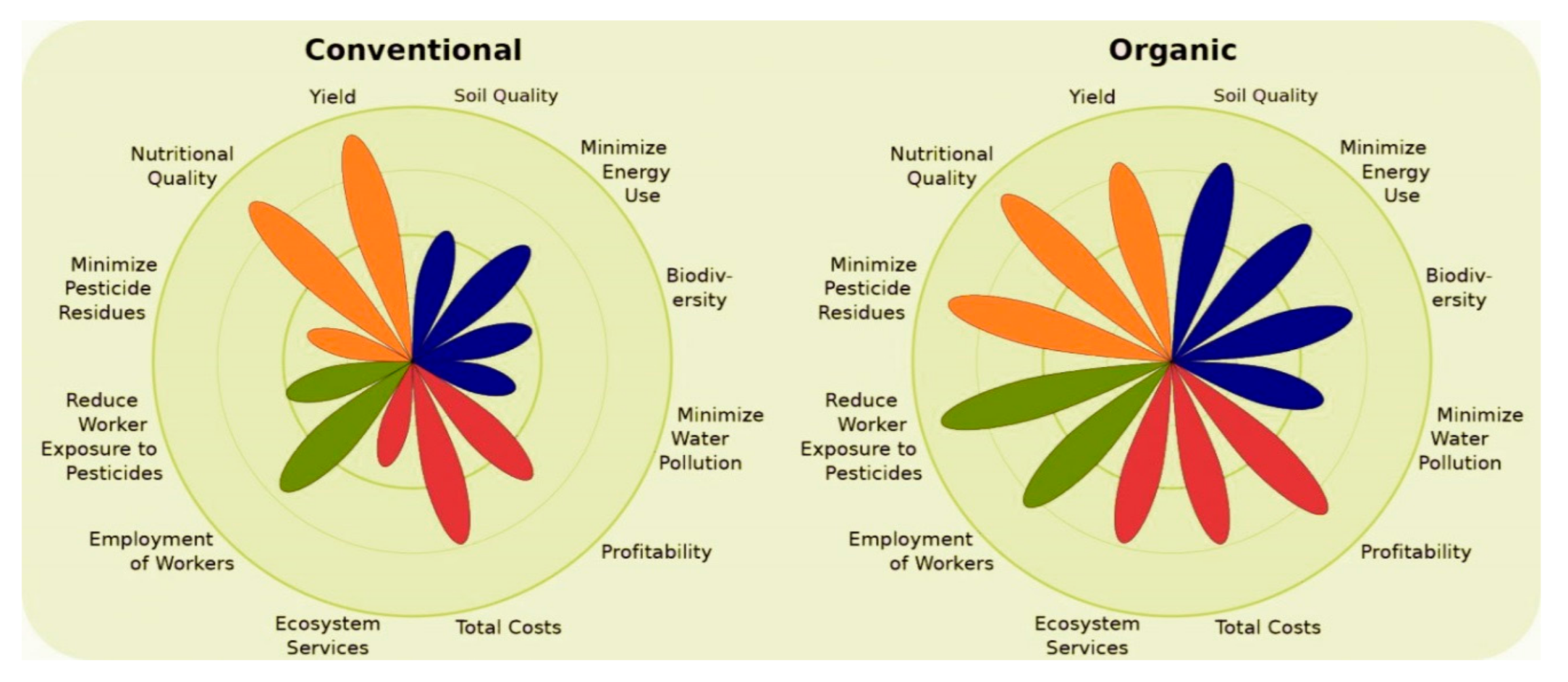
How to Prioritize Organic on a Budget
If going fully organic feels financially daunting, consider these strategies:
Grow your own produce at home or in a community garden.
Shop local at farmers’ markets, where organic options may be more affordable.
Join a CSA (Community Supported Agriculture) program to get fresh organic produce directly from farms.
Find a food co-op that offers discounts and bulk pricing on organic products.
The Regenerative Boom: Healing Agriculture from the Ground Up
Organic farming didn’t start with purchased government labels—it thrived for thousands of years before industrial agriculture turned it into a corporate game. A true organic revolution needs more than policy tweaks—it demands a return to regenerative farming the way nature intended. It’s time to bring real farming back.
Soil Health: Nature’s Real Organic Certification
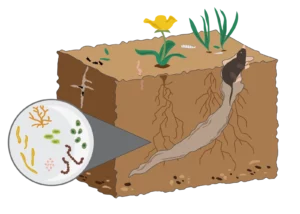
Regenerative farming practices prioritize the restoration of healthy soil ecosystems through cover cropping, crop rotations, and holistic grazing. These practices significantly improve soil health, enhancing water quality and nutrient cycling naturally.
Rodale Institute’s groundbreaking studies reveal how regenerative organic farming methods boost soil organic matter, improving soil’s capacity to store water and carbon. Healthy soil reduces runoff, prevents erosion, and curtails the harmful algae blooms associated with chemical fertilizers.
Regenerative Animal Farming: More than Just Organic
Will Harris, owner of White Oak Pastures, transformed his conventional Georgia farm into a thriving regenerative ecosystem. His cattle roam freely, grazing on pasture, which has led to remarkable carbon sequestration benefits. Notably, Harris’ regenerative farm captures more carbon than it emits, directly countering environmental degradation.
This approach contrasts sharply with industrial agriculture, where animals are confined and fed unnatural diets, leading to poorer animal welfare and environmental harm.
How to Spot Real Organic: Your Action Guide
Feeling outraged? Good! Here’s how you can reclaim your food choices:
Buy local whenever possible: Farmers’ markets, community-supported agriculture (CSAs), and independent stores that source directly from farms offer authenticity and transparency.
Use online resources: Websites like Local Harvest, Eat Wild, and state agriculture databases help you locate genuine local organic producers.
Check certifier names: Trust certifiers that emphasize integrity, and consult resources from OrganicEye and Cornucopia Institute for rankings and reviews.
Choose 100% grass-fed and finished meat: Avoid misleading claims by verifying animals have been raised fully on pasture.
The Bottom Line: Why the Fight Matters
Your food choices ripple through your health, community, and environment. Defending authentic organic agriculture means supporting soil health, animal welfare, local economies, and ultimately, human well-being. So next time you’re shopping, pause, think, and choose wisely.
Because behind every genuine organic product is a farmer whose dedication to regenerative practices ensures a healthier future—for you, your community, and the planet.

